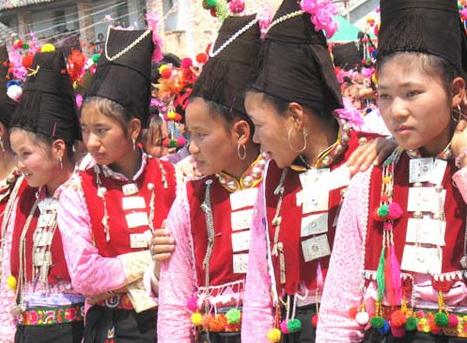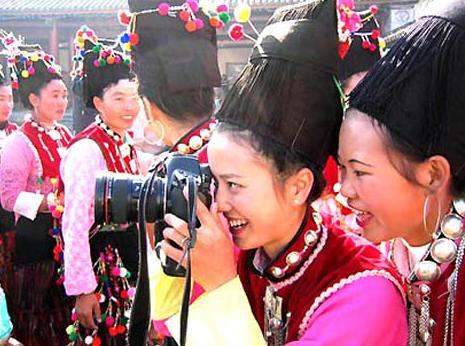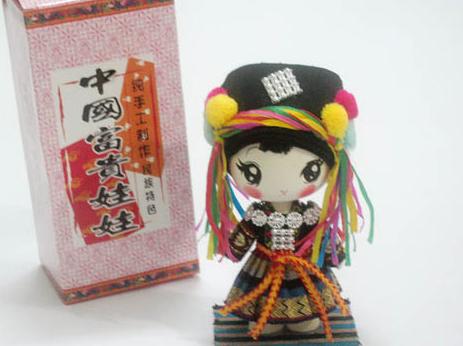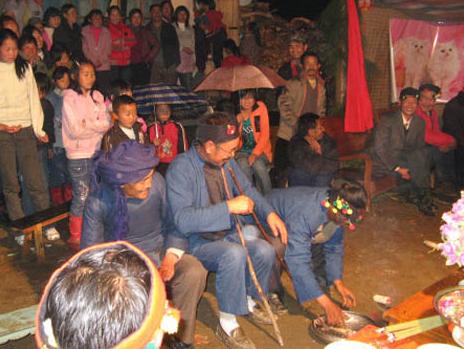
The Achang people,one of the 56 officially recognized ethnic groups in the People's Republic of China,live mainly in Longchuan and Luxi Counties in the Dehong Dai-Jingpo Autonomous Prefecture of southwestern Yunnan Province.Their language belongs to the Tibetan-Myanamese Austroasian branch of the Sino-Tibetan Phylum,but has no written form.Most Achang people also speak Putonghua and Dai.
The Achang are mountain farmers who live by agriculture,mainly rice planting.They also produce handicrafts,one of the best known being the"Husa"knife.

Certain groups have shamanistic beliefs,others practice ancestor worship.Many are also followers of Hinayana Buddhism.Achang customs forbid the slaughter of any animal on the first day of the lunar New Year.Daily rituals also forbid men outside of the immediate family to enter a household within seven days after the birth of a child.Bedrooms in Achang dwellings are on either side of the living room,the one on the left for elders and that on the right for women.There is also an upstairs bedroom for unmarried men.Custom forbids women either to go upstairs or stride over farm tools.
The Achang,in common with all peoples,have distinctive burial customs.Those in the Buddhist tradition feature a 20-meter-long strip of white cloth tied to the coffin.The officiating monk holds the loose end and heads the funeral procession to the burial site,so leading the soul of the deceased to its final destination.No metallic objects or jewels are buried with the deceased as they are believed to contaminate their future reincarnation.

The Achang people uphold the tradition of respect for the elderly and many other conventional proprieties.They are particularly hospitable hosts,and when wining and dining guests urge them,both in deed and song,to drink and eat more.It is Achang etiquette to accept what is offered,whether or not the guest has already eaten and drunk his fill.
There are many Achang courtship and wedding rituals.If a couple should call off their engagement,they return to one another any photos,locks of hair or other love tokens,as burning them would,they believe,make either one of them ill or even lose their senses.
The Achang people never choose a marriage partner who has the same surname.But although fundamentally a patriarchal society they are not averse to uxorilocal marriages,whereby the husband takes his bride's surname.During the three-day Achang wedding ceremony the newlyweds offer sweet tea to their relatives,who after drinking place congratulatory coins in the empty cup.

Achang wedding rituals demand that two groomsmen,equipped with umbrellas,accompany the husband-to-be to the bride's home.They use the umbrellas to shield the groom from the buckets of water that young women in his bride's village try to throw over him.Keeping the groom dry is the groomsmen's honorable duty,as a sodden bridegroom loses considerable face.
The bride's maternal uncle takes seat of honor at the head of the wedding banqueting table and dines on the cold dish of pig's brains set before him.When the banquet is over,he presents the newlyweds with a 4.5 kg pig's hind leg,or waijiarou,to remind them of the sacrifices the bride's family has made in bringing her up.
Achang offspring marry in descending order of age.If a younger brother or sister should marry before their elder brother or sister they must pay him or her cash compensation in respectful apology.
Achang rituals and traditions have been handed down for generations,and will continue far into the future.





